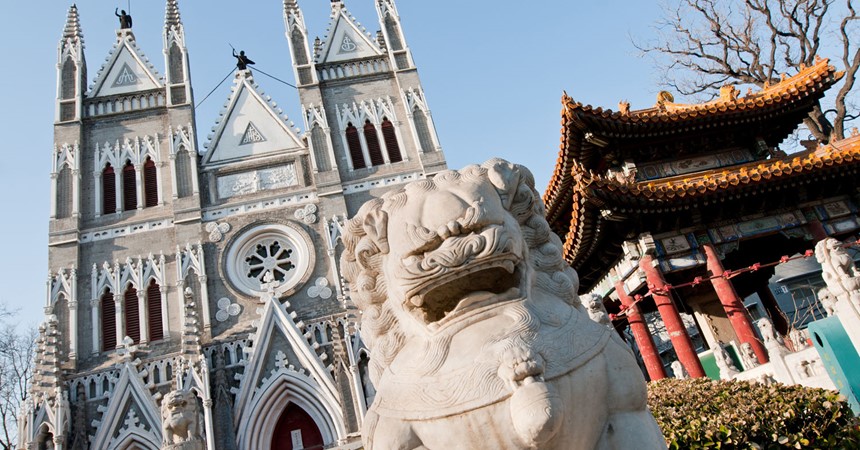Yet Christianity, Islam and Buddhism remain the Communist Party of China’s adversary. Organised religions are associated with the non-communist world and with COVID-19 exposing global supply lines and fracturing relationships, China’s relationship with the West under President Xi Jinping has become increasingly antagonistic.
The Catholic Church has endured in China since Matteo Ricci and the Jesuit missionaries of the 16th and 17th centuries, but the surviving communities are dispersed, and many Chinese have never heard of Catholicism. Yet reports from Turin-based think tank Bitter Winter, which monitors human rights and religious freedom through a network of hundreds of Chinese correspondents, suggest persecution of “underground” churches is back to the levels of Mao Zedong’s cultural revolution.
The Vatican and the Communist Party of China (CPC) have been at loggerheads since Mao took power in 1949. Unfortunately, Rome’s attempts at rapprochement have only exacerbated an internal fissure in the Chinese Catholic church itself.
Australian Jeremy Clarke, a former Jesuit whose maternal family hails from Lochinvar in the Hunter Valley, has advanced degrees in theology with a specialisation in East-West cultural exchange and missiology. A regular visitor to China since his school days in the 1980s, Dr Clarke’s years as a Jesuit and Catholic priest enabled him to work closely with groups in China.
“The big crackdown on the Catholic Church did not come until 1955 when the reigning in of religion started in earnest,” says Dr Clarke. “Until then, China had been preoccupied with the civil war and the Korean War.” But in the mid-1950s the Communist Party sought to isolate foreign religions. Religious practice of any kind was declared illegal, believers persecuted, priests imprisoned and executed, and churches destroyed or re-purposed.
The Vatican’s strident opposition to communism meant Catholicism was hit especially hard. The expulsion of foreigners from China decapitated the Catholic Church because it had relied on them to run its schools, orphanages, seminaries and religious orders. Catholicism survived, but mainly as a clan-based, rural religion and without a missionary impulse.
Apart from the crude approach of smashing the Church into submission, the CPC in 1957 established the Chinese Patriotic Catholic Association, essentially giving Beijing’s atheist leaders control. “The Patriotic Association became known as the ‘patriotic church’, but it was never a church,” says Dr Clarke. Many worshipers resisted, and faith communities boycotted “government churches” in favour of “underground churches”, the leaders of which the Vatican began to acknowledge.
After nearly 30 years of the cultural revolution, China’s leaders realised the country could not remain in a vacuum. Religion was “legalised” in 1979 but with a stipulation — the Communist Party would control the Catholic Church including the appointment of bishops. This created two Catholic lineages in China — those appointed by Beijing, and those appointed by the Vatican.
When some of the imposts of the cultural revolution were relaxed, many of the “underground churches” had begun openly practising their faith, even constructing chapels and cathedrals without Communist Party interference. But confusing the situation, the Vatican quietly started offering its blessing to many of the communist-appointed bishops.
Finally, in 2007, Pope Benedict XVI acknowledged the legitimacy of the state-sanctioned church and signalled to underground Catholics they were free to receive sacraments there. Benedict stressed there was one Catholic Church in China but in reality it struggled to unite. Then in 2018, Pope Francis reached a new agreement with the CPC.
“But no one knows the text,” says Dr Clarke. Speculation suggests the deal ensures Church teachings support Chinese patriotism and Communist Party rule.
Retired Hong Kong cardinal Joseph Zen castigated the lack of transparency and described the negotiations as an “incredible betrayal” of China’s Catholics. “They’re giving the flock to the mouths of wolves,” he said.
In the meantime, more than 500 million people have migrated from China’s rural areas in the past few decades seeking opportunities in the mega cities. This unprecedented urbanisation has created social dislocation generally, but specifically for Catholics whose cultural and faith experience has been in a village life.
“The Catholic Church in China in recent years has experienced a tumultuous and problematic existence, but it is obviously adept at negotiating,” says Dr Clarke. Importantly, its work with the poor, marginalised and homeless is increasingly recognised.
Despite President Xi’s hard-line crackdown on freedoms, Chinese society is becoming more open to spirituality and willing to embrace Catholicism. Any recalibration of Australia’s relationship with China should consider Beijing’s treatment of Tibet, Muslim Uyghurs and the Catholic Church.






















































































